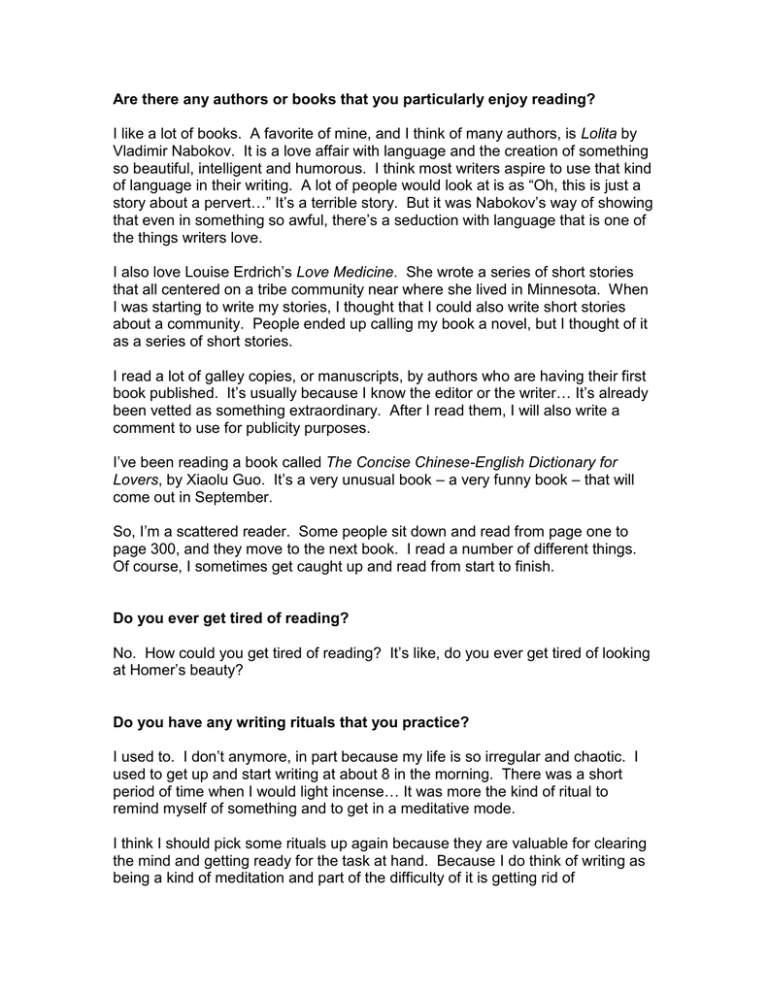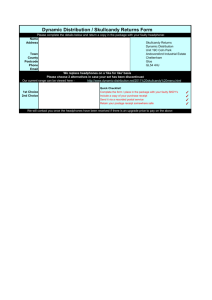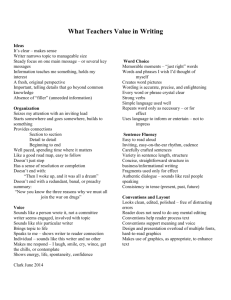Amy Tan Q and A
advertisement

Are there any authors or books that you particularly enjoy reading? I like a lot of books. A favorite of mine, and I think of many authors, is Lolita by Vladimir Nabokov. It is a love affair with language and the creation of something so beautiful, intelligent and humorous. I think most writers aspire to use that kind of language in their writing. A lot of people would look at is as “Oh, this is just a story about a pervert…” It’s a terrible story. But it was Nabokov’s way of showing that even in something so awful, there’s a seduction with language that is one of the things writers love. I also love Louise Erdrich’s Love Medicine. She wrote a series of short stories that all centered on a tribe community near where she lived in Minnesota. When I was starting to write my stories, I thought that I could also write short stories about a community. People ended up calling my book a novel, but I thought of it as a series of short stories. I read a lot of galley copies, or manuscripts, by authors who are having their first book published. It’s usually because I know the editor or the writer… It’s already been vetted as something extraordinary. After I read them, I will also write a comment to use for publicity purposes. I’ve been reading a book called The Concise Chinese-English Dictionary for Lovers, by Xiaolu Guo. It’s a very unusual book – a very funny book – that will come out in September. So, I’m a scattered reader. Some people sit down and read from page one to page 300, and they move to the next book. I read a number of different things. Of course, I sometimes get caught up and read from start to finish. Do you ever get tired of reading? No. How could you get tired of reading? It’s like, do you ever get tired of looking at Homer’s beauty? Do you have any writing rituals that you practice? I used to. I don’t anymore, in part because my life is so irregular and chaotic. I used to get up and start writing at about 8 in the morning. There was a short period of time when I would light incense… It was more the kind of ritual to remind myself of something and to get in a meditative mode. I think I should pick some rituals up again because they are valuable for clearing the mind and getting ready for the task at hand. Because I do think of writing as being a kind of meditation and part of the difficulty of it is getting rid of distractions, but also clearing away self-consciousness and being more open to all kinds of possibilities. It’s very easy to write with the idea that “… somebody’s going to read this, so I have to make it sound very impressive and smart…” So part of the meditation is getting rid of expectations and self-censorship. I do put on headphones. I found that I had to write on airplanes or in noisy environments. I put them on and discovered that they were great because I would play the same music over and over again. So the next day, because I was writing the same chapter or the same scene, the music would take me back to that much more quickly than if I were just sitting there trying to ignore something. I was once asked, “If you were stuck someplace in the world, where would it be and what three essential things would you need to have?” So, the place that I imagined was like this place… a cabin in the winter… I just went over across the Kachemak Bay to see the McBride’s place, and I said, “This is my dream!” I would need a piano, and I would need my computer because that’s how I write. And I would need some headphones. I said, “Because even though it would seem that there’s nothing going on here, there are so many wonderful sounds out there.” Birds, crackling of this, the ice crackling, the wind… And when I’d go to work, I would need to get rid of all of that… So, I’d put the headphones on. But it just seems strange because I remember them asking me “Why would you need headphones in the middle of nowhere?” Because nowhere still has sounds. Good sounds, great sounds. Do you have to listen with music without words? Yes, I listen to music without lyrics. I could be working in the middle of a party, and when I put my headphones on I’m unaware of anything that’s going on. I have a little iPod Shuffle and it has only writing music on it. But I also have a regular iPod so I can just repeat the same song over and over again. Most of the music is classical and also soundtracks. Soundtracks are made to be in the background. They have emotion, and usually there’s a rhythm to the emotion, which is perfect for writing. Do any other forms of art inspire your writing? Oh yeah. Music. I’m currently writing libretto for an opera. I’ve had 15 years of classical piano and I’m so happy to be able to use that knowledge about music. The composer is writing the music, and we talk about musical things during the writing of the libretto. There’s a certain aspect of writing libretto that is very musical… the rhythm and the way things are related to emotion. But I will also notice what the composer does when he directs people during singing, or what he’s done in composing certain parts. And in understanding his music, I will write things that I know will complement his music. I wanted to be an artist when I was growing up. I wanted to draw, I wanted to paint and do sculpture. So, I’m very appreciative of art because I also sense that in art, as in music, there’s a similar expression of the artist, the creator. And it’s the feeling that each of us as individuals can express what they see and feel in the world, and what they think the meaning of their existence in the whole of the universe is, and that expression will come out through a certain form. It could be the form of writing or music… It’s an expression of themselves. I’m very inspired by art. Do you ever get stuck? No, never, never! I’m a professional. What are you talking about? Never! And I meet all my deadlines and I have no spelling errors and I punctuate absolutely perfectly. I get stuck all the time. It’s a process of getting started. Now being stuck is not because I cannot think of anything. People think writer’s block is a block where suddenly a wall comes down and there’s nothing in front of you. Writer’s block is more writer’s chaos, and you have too many things happening. It could be external, but internal – too many things – too many images, too many directions, too many aspects of the story, too many sense of self-consciousness, selfcensorship and self-doubt. I’ve discovered over time that the way that you overcome writer’s chaos is to find a focus and to look at everything through that focus for awhile. Pretty soon, everything that was just random and chaotic starts to go through the filter. The extraneous goes away bit by bit and what is relevant to the story remains.



